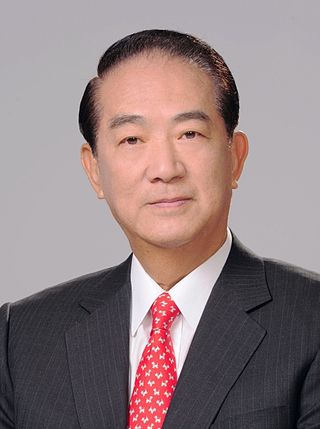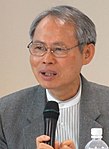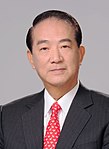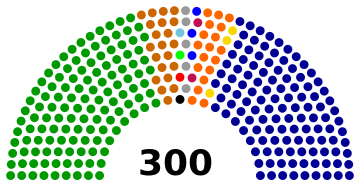
The Democratic Progressive Party (DPP) is a Taiwanese nationalist and centre-left political party in the Republic of China (Taiwan). Currently controlling both the Republic of China presidency and the unicameral Legislative Yuan, it is the majority ruling party and the dominant party in the Pan-Green Coalition as of 2023.
The Republic of China, commonly known as Taiwan is governed in a framework of a representative democratic republic under a Five-Power system envisioned by Sun Yat-sen, whereby under the constitutional amendments, the President is head of state and the Premier is head of government, and of a multi-party system. Executive power is exercised by the government. Legislative power is vested in primarily with the parliament and limited by government. The Judiciary is independent of the executive and the legislature. In addition, the Civil service power is in charge of validating the qualification of civil servants and the supervision auditory power inspects, reviews, and audits the policies and operations of the government. The party system is dominated by the Kuomintang, which favors closer links to mainland China, and the Democratic Progressive Party, which favors Taiwanese nationalism.
The pan-Blue coalition, pan-Blue force or pan-Blue groups is a political coalition in the Republic of China (Taiwan) consisting of the Kuomintang (KMT), People First Party (PFP), New Party (CNP), Non-Partisan Solidarity Union (NPSU), and Young China Party (YCP). The name comes from the party color of the Kuomintang. This coalition maintains that the Republic of China instead of the People's Republic of China is the legitimate government of China, favors a Chinese and Taiwanese dual identity over an exclusive Taiwanese identity, and favors greater friendly exchange with Mainland China, as opposed to the Pan-Green Coalition.

The People First Party is a centrist or centre-right political party in the Republic of China (Taiwan).

James Soong Chu-yu is a Taiwanese politician. He is the founder and current Chairman of the People First Party.

The Taiwan Solidarity Union (TSU) is a political party in Taiwan which advocates Taiwan independence, and is affiliated with the Taiwanese localization movement. It was officially founded on 12 August 2001 and is considered part of the Pan-Green Coalition. Unlike the Democratic Progressive Party, its larger companion party in the Pan-Green Coalition, the TSU actively campaigns for the creation of a de jure Republic of Taiwan. The future of the party is in doubt after the 2016 elections as the party failed to secure enough votes to be eligible for state funding.

The Legislative Yuan is the unicameral legislature of the Republic of China (Taiwan) located in Taipei. The Legislative Yuan is composed of 113 members, who are directly elected for 4-year terms by people of the Taiwan Area through a parallel voting system.

The National Assembly was the authoritative legislative body of the Republic of China, commonly referred to as Taiwan after 1949, from 1947 to 2005. Along with the Control Yuan and the Legislative Yuan, the National Assembly formed the tricameral parliament of China. If still functional, at 3,045 members, the National Assembly would have been the largest parliamentary chamber in the world.

The Constitution of the Republic of China is the fifth and current constitution of the Republic of China (ROC), ratified by the Kuomintang during the Constituent National Assembly session on 25 December 1946, in Nanjing, and adopted on 25 December 1947. The constitution, along with its Additional Articles, remains effective in ROC-controlled territories.

Presidential elections were held in Taiwan on 20 March 2004. A consultative referendum took place on the same day regarding relations with the People's Republic of China.

The 2004 Taiwanese legislative election was held on 11 December 2004. All 225 seats of the Legislative Yuan were up for election: 168 elected by single non-transferable vote, 41 elected through party-list Proportional representation, eight elected from overseas Chinese constituencies on the basis of the proportion of nationwide votes received by participating political parties, eight elected by popular vote among the aboriginal populations. Members served three-year terms beginning on 1 February 2005, and ending 31 January 2008. The next term served four years.

This is a timeline of the Republic of China.

The 2001 Taiwanese legislative election was held on 1 December 2001. All 225 seats of the Legislative Yuan were up for election: 168 elected by popular vote, 41 elected on the basis of the proportional representation based of the nationwide votes received by participating political parties, eight elected from overseas Chinese constituencies on the basis of the proportion of nationwide votes received by participating political parties, eight elected by popular vote among the Taiwanese aboriginal populations. Members served three year terms from February 1, 2002 to February 1, 2005.
The 2005 Kuomintang chairmanship election was held on July 16, 2005 in Taiwan between Ma Ying-jeou and Wang Jin-pyng. The election was triggered by the retirement of chairman Lien Chan.

The 2008 Taiwanese legislative election was held on 12 January 2008 for members of the Legislative Yuan. It was the first Legislative Yuan election after the constitutional amendments of 2005, which extended term length from three to four years, reduced seat count from 225 to 113, and introduced the current electoral system.
Referendums in Taiwan at both the national and local level are governed by the Referendum Act of Taiwan, which was enacted by the Legislative Yuan in December 2003. Citizens can propose laws via referendums at the national and local levels. The Referendum Act also allowed people to make changes or abolish laws by referendums.

Presidential elections were held in Taiwan on 14 January 2012. The election was held concurrently with legislative elections. It was the fifth direct election for the President of the Republic of China. Prior to 1996, the President was elected by the ROC's National Assembly and not directly by the people.

Presidential elections were held in Taiwan on 16 January 2016. Democratic Progressive Party (DPP) candidate Tsai Ing-wen with her independent running mate Chen Chien-jen won over Eric Chu of the Kuomintang (KMT) and James Soong of the People First Party (PFP). Tsai became the first female president in Taiwan, as well as the Chinese-speaking world.
Chung Shao-ho is a Taiwanese politician who served in the Legislative Yuan from 1999 to 2012.
A constitutional referendum was held in Taiwan on 26 November 2022. Voters voted on adding Article 1-1 to the Additional Articles of the Constitution of the Republic of China. If passed, the voting age would be lowered from 20 to 18 years. The amendment would also lower the minimum age of candidacy from 23 to 18 years, but would only have an effect once the relevant electoral laws are amended accordingly.



















